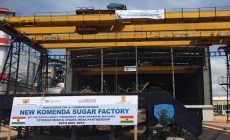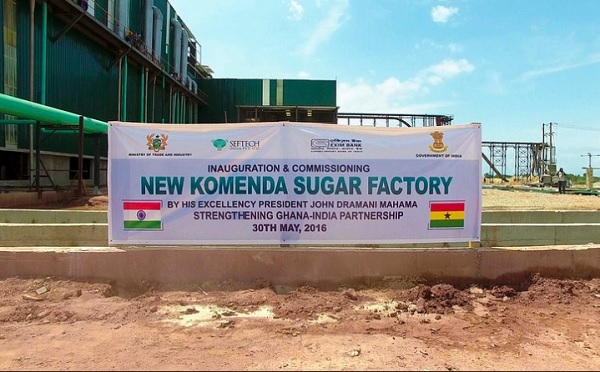Komenda sugar factory is back
- Posted on
- Comment
 All is set for the much talked about Komenda Sugar Factory to commence commercial production of Sugar on Monday, November 28, 2016.
All is set for the much talked about Komenda Sugar Factory to commence commercial production of Sugar on Monday, November 28, 2016.
Ghana currently spends more than $200 million on sugar importation annually and the Komenda Sugar Factory is expected to reduce this huge import bill on sugar.
At full capacity, the company can produce 10% of Ghana’s sugar needs, an indication that there is room for expansion if raw material production can be increased significantly.
1,018 out-grower farmers registered
So far, the company has registered 1,018 out-grower farmers who have cultivated sugarcane on over 3,000 acres of land, Director of Strategy and Communication of the Komenda Sugar Factory, Mr Ransford Vani-Amoah, has told The Finder in an interview.
According to him, the registered out-growers come from three divisions namely, Shama area in the Western Region, Komenda, Edina, Eguafo, Abrem (KEEA) areas in the Central Region and Abura, Asebu, Kwamankese area also in the Central Region.
He added that the factory was also expecting additional sugarcane from suppliers operating in the Agona District and other places which could increase the cultivated sugarcane available to about 6,000 acres of land.
The factory is relying on supplies from about 100km radius covering parts of Western, Eastern, Greater Accra and the Central Regions for raw material needs.
8,000 acres of sugarcane required
He explained that the factory needs 8,000 acres of sugarcane to operate at full capacity of 1,250 tonnes crushing per day (TCD) of raw sugarcane.
1,250 tonnes of sugarcane a day
Mr Vani-Amoah explained that if the company operates at full capacity of 1,250 tonnes of sugarcane a day, the estimated available sugarcane would run out in about four months.
As a result, he said the factory plans to operate at about 70% capacity per day for production to run for about six months before being shutdown April ending before the rainy season sets in.
80 Indians arrive next week
He announced that some 80 Indians with expertise in sugar production are expected in the country next week to be assisted with at least 300 Ghanaian workers in readiness for production to commence.
Since the recruitment of workers was still ongoing, he said the number of Ghanaian employees may increase with time.
3 shifts of 100 workers per shift
Mr Vani-Amoah disclosed that the factory would run three shifts per day of eight hours with 100 Ghanaian workers per shift.
GH?70 for a tonne of sugarcane
He explained that the factory has reached agreement to buy a tonne of sugarcane from farmers for GH?70 as against the GH?90 offered during the testing of the factory machines.
According to him, when the tonne was bought for GH?90, the farmers lacked labourers to harvest the sugarcane, load onto the trucks, transport to the factory and offload the sugarcane.
Consequently, the factory and company have agreed that GH?70 be paid for one tonne while the factory bears the cost of harvesting, loading and offloading as well as transportation.
Mr Vani-Amoah said the factory also plans to support the farmers with free extension services, loans, planting materials and services such as land preparation for a fee on credit.
He said when the farmers supply sugarcane to the factory, the loans and fee charged for the services would be deducted over time.
He noted that the factory plans to leverage on credit products offered farmers by Agricultural Development Bank (ADB) and National Investment Bank (NIB) to enable farmers secure more funding.
Meeting on November 22
He said the board and stakeholders would meet next week Tuesday November 22, 2016 at the Ministry of Trade ahead of the start of planned commercial production.
Mr Vani-Amoah explained that over 4,000 barrels of molasses generated from sugarcane processed during the commissioning of the plant has been sold to Akpeteshie distillers at the cost of GH?40 per barrel.
Burkina Faso and Cote d’ Voire
He said Burkina Faso and Cote d’ Ivoire have expressed interest in sending their raw sugar to Komenda Sugar Factory to be refined into white sugar under a tolling arrangement.
He stated that government intends to establish a sugar factory school to train more Ghanaians as the country has the potential to expand sugar production.
Mr Vani-Amoah stated that a delegation from the factory in visiting communities to educate them on the benefits of growing sugarcane and how the company intends to support them.
The Komenda Sugar Factory was closed down as scheduled; barely a month after President John Dramani Mahama commissioned it on May, 30.
Parliament approved $24.5million loan facility from the Exim Bank of India to finance the development of an irrigation system, and the cultivation of sugarcane to feed the Komenda Sugar Factory.
The facility has a grace period of five years, an interest rate of 1.50 percent per annum, a maturity period of 25 years, a commitment fee of 0.50 percent per annum as well as a repayment period of 20 years.
Part of the amount is expected to be used to develop a sugarcane plantation and also extend support to the farmers, to help produce sufficient sugarcane as raw material to feed the factory.
Under the agreement, total land acreage of 2000 of the factory’s own land is expected to be cultivated to produce more than 100,000 tons of sugarcane per annum.
Irrigation schemes are also expected to be developed under the project to serve the nucleus farms of the Komenda Sugar Factory and adjoining communities.
According to the agreement, out growers within the catchment area of the factory, will also be assisted with improved seed variety and extension services to help increase production and create jobs for rural youth.
By Elvis DARKO, Accra










 (Selorm) |
(Selorm) |  (Nana Kwesi)
(Nana Kwesi)